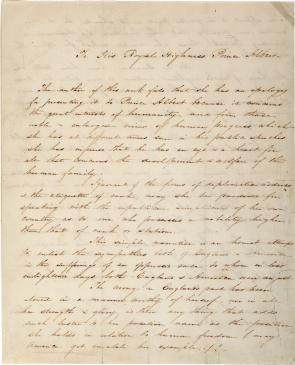Harriet Beecher Stowe sends Uncle Tom’s Cabin to Queen Victoria and Prince Albert, 1852
A Spotlight on a Primary Source by Harriet Beecher Stowe
 Harriet Beecher Stowe’s opposition to the Fugitive Slave Law of 1850 inspired her to write Uncle Tom’s Cabin. The novel, first serialized in newspapers and then published in 1852 as a two-volume work, enjoyed tremendous success in the United States and abroad, most notably in England. On the eve of publication, Stowe presented a copy of Uncle Tom’s Cabin to Prince Albert and Queen Victoria. In this accompanying letter addressed to Prince Albert, Stowe acknowledged that England had made some strides since the “less enlightened days” in their treatment of an “oppressed race.” She then appealed to the sympathetic hearts of the British people and their queen, writing “the author is encouraged by the thought that beneath the royal insignia of England throbs that woman’s and mother’s heart.”
Harriet Beecher Stowe’s opposition to the Fugitive Slave Law of 1850 inspired her to write Uncle Tom’s Cabin. The novel, first serialized in newspapers and then published in 1852 as a two-volume work, enjoyed tremendous success in the United States and abroad, most notably in England. On the eve of publication, Stowe presented a copy of Uncle Tom’s Cabin to Prince Albert and Queen Victoria. In this accompanying letter addressed to Prince Albert, Stowe acknowledged that England had made some strides since the “less enlightened days” in their treatment of an “oppressed race.” She then appealed to the sympathetic hearts of the British people and their queen, writing “the author is encouraged by the thought that beneath the royal insignia of England throbs that woman’s and mother’s heart.”
In 1853, Stowe traveled to England on a book tour and was well received by the people there. Uncle Tom’s Cabin continues to be one of the most widely read books in the world.
A full transcript is available.
Transcript
To His Royal Highness Prince Albert
The author of this work feels that she has an apology for presenting it to Prince Albert because it concerns the great interests of humanity and from those noble & enlarged views of human progress, which she has at different times seen in his public speeches she has inferred that he has an eye & a heart for all that concerns the development & welfare of the human family.
Ignorant of the forms of diplomatic address & the etiquette of rank, may she be pardoned for speaking with the republican simplicity of her own country as to one who possesses a nobility higher than that of rank or station.
This simple narrative is an honest attempt to enlist the sympathies both of England & America in the sufferings of an oppressed race, to whom in less enlightened days both England & America were unjust.
The wrong on England’s part has been atoned in a manner worthy of herself, nor in all her strength & glory, is there any thing that adds such lustre to her [struck: position] name as the position she holds in relation to human freedom (may America yet emulate her example!)? –
The appeal is in greater part as it should be to the writer’s own country, but when fugitives by thousands are crouding British shores she would enlist for them the sympathy of British hearts.
We, in America, have been told that the throne of Earth’s mightiest nation is now filled by One less adorned by all this world can give of power and splendour, than by a good & noble heart – a heart ever ready to feel for the suffering the oppressed and the lowly.
The author is encouraged by the thought that beneath the royal insignia of England throbs that woman’s & mother’s heart. May she ask that He who is nearest to her would present to her notice this simple story. Should it win from her compassionate nature, pitying thoughts for those multitudes of poor outcasts who have fled for shelter to the shadow of her throne, – it were enough.
May the blessing of [inserted above: God] rest on the noble country from which America draws her lineage, & on Her the Queen of it. Tho all other thrones be shaken may hers founded deep in the hearts of her subjects, be established to Her & to Her children, thro all generations
With deep respect
Harriet Beecher Stowe
Brunswick Maine
March 20 1852.
